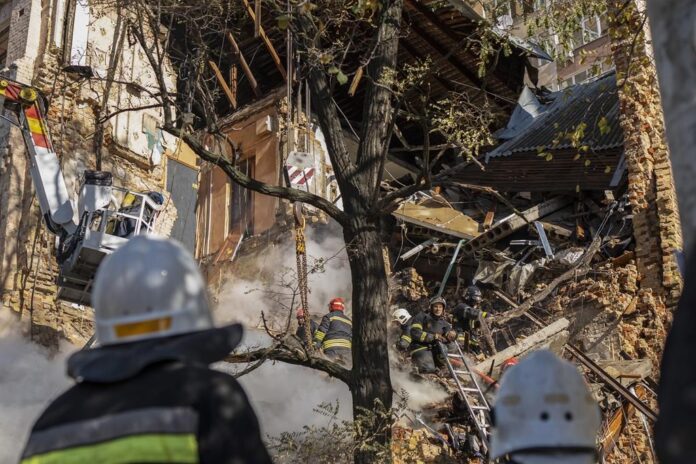Canada is imposing new sanctions against 34 Russian individuals and one entity who Canadian officials say are “complicit” in spreading Russian “disinformation and propaganda” about the Kremlin’s war in Ukraine.
Foreign Affairs Minister Melanie Joly says Russian President Vladmir Putin has sought for years to undermine Ukraine’s territorial integrity through state media and proxies that “parrot President Putin’s ahistorical talking points and patently false legal claims.”
Russia has also attempted to obscure facts by severely restricting media freedoms and smothering legitimate political dissent, detaining people who have the courage to speak out against Putin’s domestic repression and military aggression abroad, Joly said in a statement Monday.
Ottawa says the 34 individuals and one entity that Canada is targeting with new sanctions have been helping to assist the Kremlin in spreading false narratives that serve as pretexts for Putin’s war.
Those complicit in the justification of Russian human rights abuses must be held accountable, Joly said.
1:50
Ukrainians mark Defenders Day as Russia’s war rages on
“The Russian regime’s war depends on lies and deception. It muzzles and imprisons its own citizens who dare speak the truth,” she said in a statement.
“As the number of Russian human rights abuses continues to increase, Canada is taking measures to counter the propaganda that attempts to excuse them. We see through the lies. Canada stands with Ukraine.”
These are just the latest in a number of sanctions imposed by the Canadian government against Russian officials in response to Putin’s attacks and annexation of several regions of Ukraine following Russian-imposed elections that have been denounced as illegitimate by many Western leaders.
On Sept. 30, Canada sanctioned 43 Russian oligarchs, financial elites and their family members and 35 Russia-backed senior officials in Donetsk, Luhansk, Kherson and Zaporizhzhia.
The timing of Monday’s announcement coincides with a visit to Ottawa by human rights and media freedom activists Bill Browder and Evgenia Kara-Murza, wife of detained Russian opposition leader Vladimir Kara-Murza.
It also comes as the Ukrainian capital of Kyiv was the target of a new barrage of attacks Monday, as waves of explosives-laden suicide drones set buildings ablaze, sending terrified civilians running for shelter while others tried to shoot down the kamikazes.
The concentrated use of the drones was the second barrage in as many weeks — after months in which air attacks had become a rarity in central Kyiv. The assault sowed terror and frayed nerves as blasts rocked the city. Energy facilities were struck and one drone largely collapsed a residential building, killing four people, authorities said.
“The whole night, and the whole morning, the enemy terrorizes the civilian population,” Ukrainian President Volodymyr Zelenskyy said in a social media post. “Kamikaze drones and missiles are attacking all of Ukraine.”
“The enemy can attack our cities, but it won’t be able to break us,” he wrote.
Russia has ramped up its bombing campaign in the face of a Ukrainian counteroffensive that has seen Kyiv’s forces take back territory once held by Russia in the east. In response to the embarrassing defeats, Putin has illegally annexed four Ukrainian regions and ordered a partial mobilization of troops to the region.
Putin has also put the world on alert after he began ramping up nuclear threats in recent weeks, warning on Sept. 21 that he was not bluffing when he said he would be willing to use nuclear weapons to defend Russia against what he claimed was “nuclear blackmail” from major western powers. U.S. President Joe Biden has said the world faces the biggest risk of nuclear Armageddon since the 1962 Cuban Missile Crisis.
Meanwhile, western support for Ukraine has continued while the nation has fast-tracked its bid to join NATO. Last week, a Russian Security Council official was quoted in state media as saying Ukrainian admission into the military alliance would mean a “guaranteed escalation” into a Third World War.
Russia has called its actions in Ukraine since the Feb. 24 invasion a “special operation” that it says is not designed to occupy territory, but to destroy its southern neighbour’s military capabilities and capture what it regards as dangerous nationalists. It has denied deliberately attacking civilians.
The West has dismissed this and called it an attempt at an imperialistic-style land grab. In response, Canada and its allies have rallied around Ukraine to provide it with military and financial support, while also economically punishing Russia and its allies with severe sanctions.
Putin said on Friday that he had no regrets about the “special military operation,” which he casts as an existential battle with an aggressive and arrogant West that he says wants to destroy and carve up Russia.
But nearly eight months into a war that has triggered the biggest confrontation with the West since the 1962 Cuban Missile Crisis, even Russia’s most basic aims are far from achieved.
The vast army of a former superpower has been humbled on the field of battle by a much smaller Ukrainian force backed up with weapons, intelligence and advice from Western powers led by the United States. Tens of thousands have died on both sides, according to U.S. intelligence.
— with files from Global reporter Aaron D’Andrea, The Associated Press and Reuters



